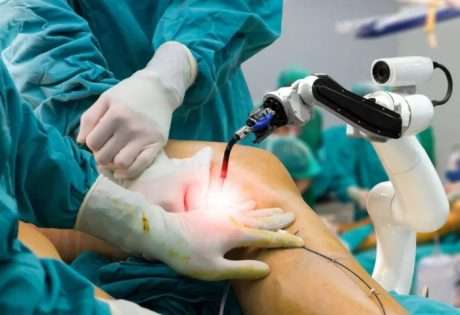
Whether you’re suffering with arthritis, sports injuries, or age-related knee pain, the advances in knee pain treatment offer promising options for managing your condition effectively.
Knee pain is a prevalent issue impacting individuals across various age groups, including athletes and seniors. With the continuous advancement of medical science, novel and innovative treatments are being developed to alleviate discomfort and enhance the quality of life for those experiencing knee pain. Let’s delve into the newest developments for the best treatment for knee pain and uncover the latest therapies and innovations.
The Evolution of Knee Pain Treatment
Over the years, doctors have tackled knee pain with a range of approaches. On one end of the spectrum, patients underwent major surgeries. On the other, they followed gentler paths like physical therapy or simply resting the affected joint. But today’s treatments aim for offering powerful relief without resorting to drastic measures. These newer methods identify the root causes of knee pain with precision. Many are far less invasive than traditional surgeries, freeing patients’ lengthy hospital stays and gruelling recoveries.
Latest Knee Pain Therapies
Minimally Invasive Procedures
Advancements in surgical techniques have led to less invasive procedures for treating knee pain.
a) Arthroscopic Procedures: In this minimally invasive surgery, surgeons make small incisions and use a camera to diagnose and treat various knee conditions.
b) Radiofrequency Ablation: In this procedure, surgeons use radio waves to destroy nerve fibres carrying pain signals from the knee to the brain, trying to relieve long-lasting pain.
Advanced Imaging and Precision Treatments
The development of new imaging technologies is enabling surgeons to perform more precise diagnoses and treatments of knee pain.
Computer-Assisted Surgery: This technology allows surgeons to place implants more precisely during knee replacement surgery, which helps improve outcomes and reduce recovery time.
3D-Printed Custom Implants: Advanced imaging and 3D printing technology enable surgeons to create custom-fit knee implants to suit patients’ unique anatomy.
Hydrogel Injections
These injections are used to treat osteoarthritis. The medication provides cushioning and lubrication to the knee joint, reducing pain.
Regenerative Medicine
This is considered an exciting advancement in knee pain treatment. This approach uses the body’s natural healing processes to repair damaged tissues.
Stem Cell Therapy: This treatment injects stem cells into the affected knee area. These cells can regenerate damaged cartilage and reduce inflammation.
Platelet-rich plasma (PRP) Therapy: In this technique, surgeons concentrate the patient’s platelets to accelerate the healing of injured tendons, ligaments, muscles, and joints.
Some new knee pain treatments include using extremely cold temperatures to temporarily turn off sensory nerves, which provides pain relief for several months.
In some cases, surgeons resort to a minimally invasive procedure to reduce blood flow to inflamed areas of the knee. This decreases pain and inflammation in patients, especially those suffering from osteoarthritis.
Matrix-Induced Autologous Chondrocyte Implantation, or MACI, is a cell therapy that uses a patient’s own cells to repair damaged knee cartilage. For some patients, this is an alternative to knee replacement.
Cooled Radiofrequency Ablation is an advanced version of radiofrequency ablation. This technique provides a larger treatment area and longer-lasting pain relief.
Knee Pain Innovations in Chennai
Chennai is known for its advanced medical facilities and is a forerunner in adopting many innovative knee pain treatments. Several hospitals and specialised clinics in the city offer cutting-edge therapies:
These facilities in Chennai are equipped with cutting-edge technology and staffed by experienced specialists, making them excellent choices for those seeking the best treatment for knee pain.
The Future of Knee Pain Treatment
As research continues, several promising avenues are being looked at for future knee pain treatments:
Gene Therapy: Scientists are investigating ways to use gene therapy to promote cartilage growth and reduce inflammation in arthritic knees.
Nanotechnology: Researchers are developing nanoparticles to deliver drugs directly to affected areas in the knee, which is expected to increase effectiveness and reduce side effects.
Bionic Implants: Advanced prosthetics that closely mimic natural knee function are being developed, and this is expected to offer better outcomes for those requiring knee replacement.
Wearable Tech for Pain Management: Scientists and technologists are trying to develop wearable tech to monitor knee movement and provide real-time feedback for pain management.
AI-in Diagnosis and Treatment Planning: Artificial intelligence is being integrated into diagnostic imaging and treatment planning. This is expected to improve the accuracy and personalisation of knee pain treatments.
Choosing the Right Treatment
With so many advances in knee pain treatment, choosing the right approach for your specific condition is essential.
1. Consult a Specialist: An experienced orthopaedic specialist can help determine the best treatment plan based on your condition and the latest available options.
2. Consider Non-Invasive Options First: Many new treatments offer effective pain relief without surgery. Explore these options before selecting invasive procedures.
3. Stay Informed: Keep up with the latest advances in knee pain treatment. New therapies are constantly being developed and approved.
4. Evaluate Risks and Benefits: Each treatment has benefits and risks. Discuss these thoroughly with your healthcare provider.
5. Think Long-Term: Consider immediate pain relief, long-term outcomes, and potential impact on your lifestyle.
New knee pain treatments are evolving, offering hope for those suffering from chronic knee pain. From regenerative therapies to minimally invasive procedures, these advances are changing the landscape of knee pain management. For residents of Chennai, access to many of these cutting-edge treatments is readily available at world-class medical facilities.



